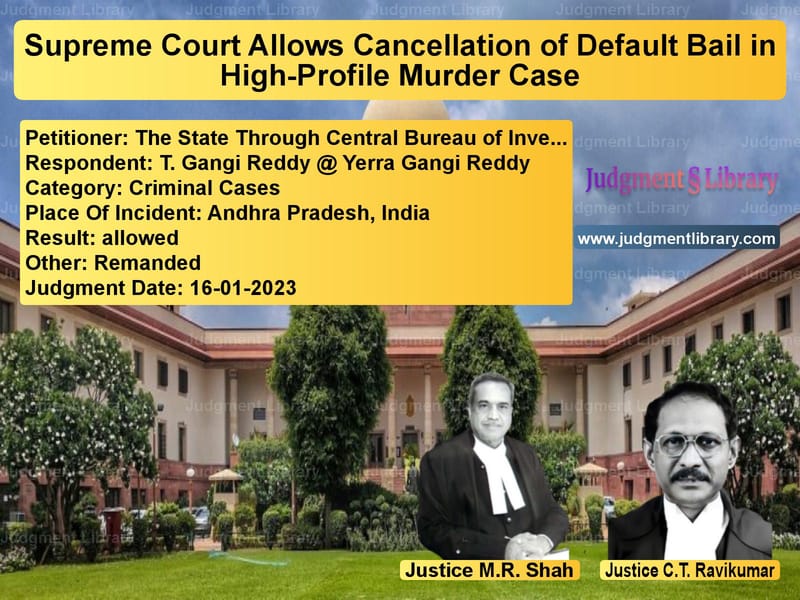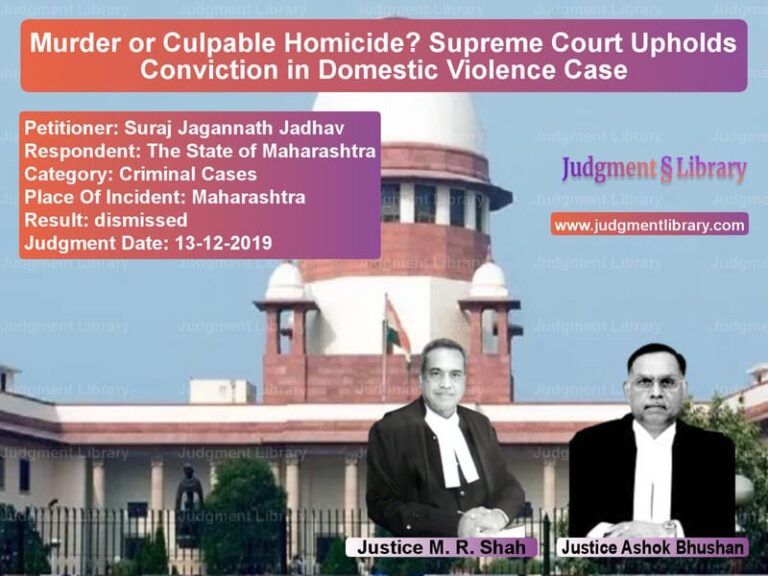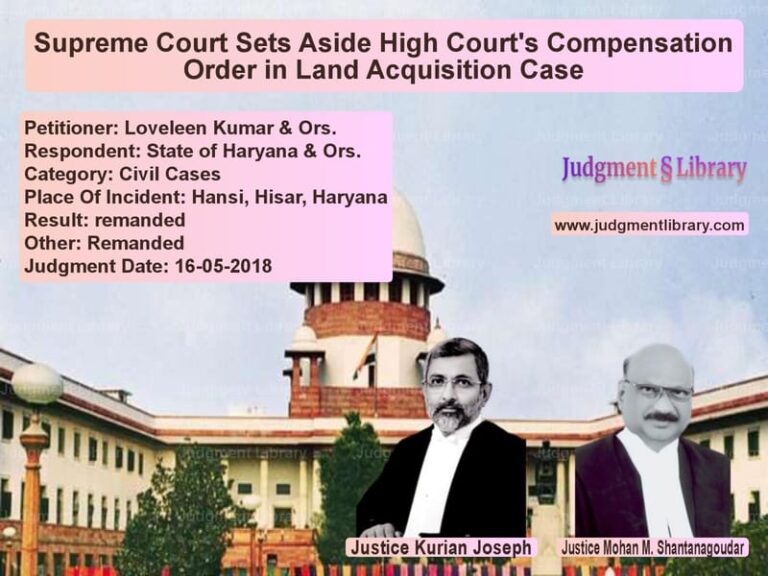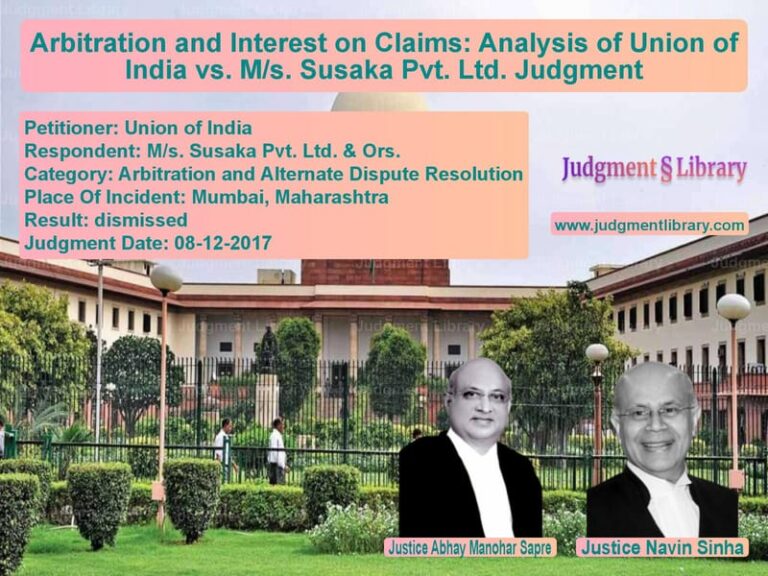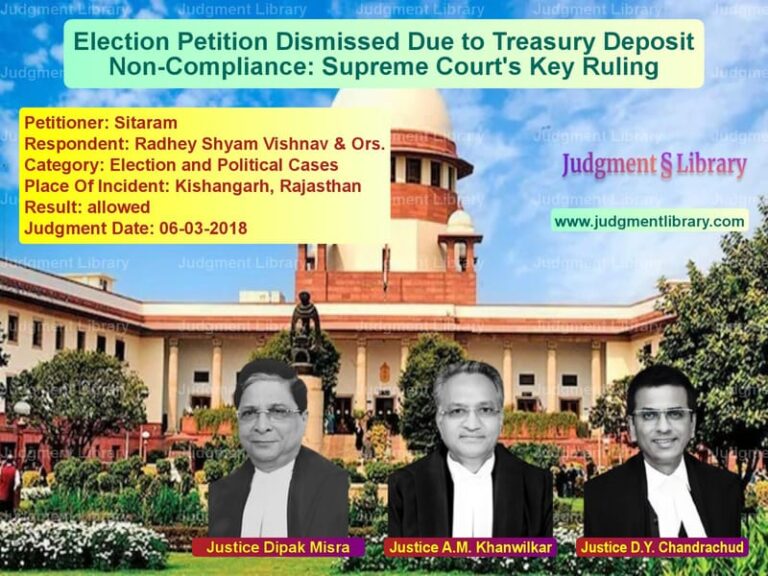Supreme Court Allows Cancellation of Default Bail in High-Profile Murder Case
The case of The State Through Central Bureau of Investigation v. T. Gangi Reddy @ Yerra Gangi Reddy revolves around the legal interpretation of default bail granted under Section 167(2) of the Code of Criminal Procedure (Cr.P.C.). The Supreme Court ruled that an accused released on default bail can have their bail cancelled if a strong case is made out upon the filing of a charge sheet, reinforcing the balance between personal liberty and criminal justice.
Background of the Case
The case pertains to the murder of Y.S. Vivekananda Reddy, a former Member of Parliament and political leader in Andhra Pradesh. He was found dead in his residence on March 15, 2019. Initially, the case was registered under Section 174 of the Cr.P.C. as a suspicious death, but later, it was reclassified under Section 302 read with Section 120-B of the Indian Penal Code (I.P.C.) after further investigation.
The Special Investigation Team (SIT) of the Andhra Pradesh police initially investigated the case and arrested T. Gangi Reddy (Accused No. 1) on March 28, 2019. He was remanded to judicial custody. However, since the statutory period of 90 days to file a charge sheet had expired on June 26, 2019, he applied for default bail under Section 167(2) of the Cr.P.C. and was granted bail on June 27, 2019.
Later, the investigation was transferred to the Central Bureau of Investigation (CBI) on March 11, 2020. The CBI filed its First Information Report (FIR) on July 9, 2020, revealing that a conspiracy had been hatched by multiple accused, including A-1 to A-4. Based on fresh evidence, the CBI sought to cancel the bail granted to Accused No. 1 under Section 439(2) of the Cr.P.C. The Andhra Pradesh High Court dismissed the petition, holding that default bail granted under Section 167(2) Cr.P.C. could not be cancelled on merits. The CBI then appealed to the Supreme Court.
Key Legal Issues
1. Can Bail Granted Under Section 167(2) Be Cancelled on Merits?
The CBI argued that bail granted due to default in filing the charge sheet within the statutory period should not prevent its cancellation on merits if strong evidence emerges later.
The Supreme Court observed:
“An order for release on bail under proviso (a) to Section 167(2) is not an order on merits but an order-on-default of the prosecuting agency.”
Therefore, it ruled that once a charge sheet is filed and strong evidence emerges, the Court has the power to cancel bail under Sections 437(5) and 439(2) of the Cr.P.C.
2. Did the CBI Present Strong Enough Grounds for Bail Cancellation?
The CBI contended that:
- New evidence had emerged linking Accused No. 1 to the murder.
- There were allegations of witness tampering and intimidation.
- The accused had tried to obstruct the investigation.
- The High Court erred in holding that default bail could not be cancelled based on subsequent revelations.
The Supreme Court concurred with the CBI’s arguments, stating:
“The Court cannot be precluded from considering the application for cancellation of bail on merits if the accused has committed a serious, non-bailable offense.”
3. Does a Charge Sheet Automatically Justify Cancellation?
The defense argued that once default bail is granted, the accused should not be re-arrested simply because a charge sheet has been filed.
However, the Supreme Court clarified:
“While mere filing of the charge sheet is not sufficient, if the charge sheet reveals strong evidence of the accused’s involvement in a non-bailable offense, bail can be cancelled.”
Supreme Court’s Judgment
The Supreme Court ruled in favor of the CBI and set aside the High Court’s decision, stating:
- The default bail granted to the accused can be cancelled if strong evidence is presented in the charge sheet.
- The matter was remitted back to the Telangana High Court for reconsideration of the CBI’s application to cancel bail.
- Witness tampering and obstruction of justice are valid grounds for bail cancellation.
Implications of the Judgment
The ruling sets a significant precedent for criminal law in India:
- Default Bail Is Not Absolute: This decision clarifies that bail granted due to procedural lapses can still be cancelled if new, compelling evidence emerges.
- Investigating Agencies Can Seek Bail Cancellation: The judgment empowers agencies like the CBI to challenge default bail if strong evidence is uncovered post-investigation.
- Prevention of Witness Tampering: Courts can revoke bail if there is evidence of the accused interfering with witnesses or obstructing justice.
Conclusion
The Supreme Court’s ruling in The State Through CBI v. T. Gangi Reddy reinforces the principle that default bail is not a shield against subsequent judicial scrutiny. While upholding an individual’s right to bail under Section 167(2), the Court ensures that serious offenders do not misuse procedural lapses to escape trial. This case serves as a crucial reference for future cases involving bail revocation on new evidence.
Petitioner Name: The State Through Central Bureau of Investigation.Respondent Name: T. Gangi Reddy @ Yerra Gangi Reddy.Judgment By: Justice M.R. Shah, Justice C.T. Ravikumar.Place Of Incident: Andhra Pradesh, India.Judgment Date: 16-01-2023.
Don’t miss out on the full details! Download the complete judgment in PDF format below and gain valuable insights instantly!
Download Judgment: the-state-through-ce-vs-t.-gangi-reddy-@-yer-supreme-court-of-india-judgment-dated-16-01-2023.pdf
Directly Download Judgment: Directly download this Judgment
See all petitions in Bail and Anticipatory Bail
See all petitions in Murder Cases
See all petitions in Fraud and Forgery
See all petitions in Extortion and Blackmail
See all petitions in Judgment by Mukeshkumar Rasikbhai Shah
See all petitions in Judgment by C.T. Ravikumar
See all petitions in allowed
See all petitions in Remanded
See all petitions in supreme court of India judgments January 2023
See all petitions in 2023 judgments
See all posts in Criminal Cases Category
See all allowed petitions in Criminal Cases Category
See all Dismissed petitions in Criminal Cases Category
See all partially allowed petitions in Criminal Cases Category

